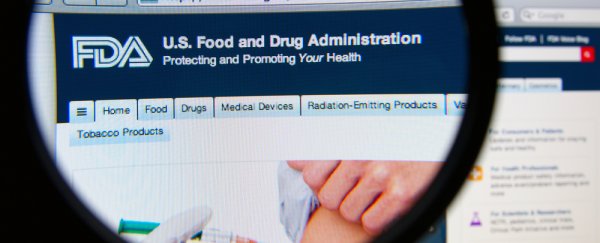A recent investigation has revealed that the US Food and Drug Administration (FDA) has been hiding evidence of scientific fraud that it comes across. And as Robbie Gonzalez writes over at io9, you should be pissed.
The FDA is the agency put in charge of regulating the safety of all food and prescription drugs that go on sale in the US. But it turns out that when their inspections find examples of scientific misconduct in clinical trials - for example, the kind that proves whether or not a drug is safe - they don't just keep it secret, they actually cover it up, as Charles Seife, a science writer and professor of journalism at NYU, has revealed.
Publishing in the Journal of the American Medical Association, Seife writes:
"Every year, the US Food and Drug Administration (FDA) inspects several hundred clinical sites performing biomedical research on human participants and occasionally finds evidence of substantial departures from good clinical practice and research misconduct. However, the FDA has no systematic method of communicating these findings to the scientific community, leaving open the possibility that research misconduct detected by a government agency goes unremarked in the peer-reviewed literature."
In his investigation, Seife looked at 78 scientific papers that had been published as a result of 57 clinical trials that had been classified as tainted. Which means "FDA inspectors found significant problems with the conduct of the trial, up to and including fraud," Seife writes in an accompanying piece over on Slate. Only three of these publications mentioned any of the problems that the FDA found.
The reasons that these clinical trials had been marked as tainted were also pretty severe, and included at least one of: "falsification or submission of false information… problems with adverse events reporting… protocol violations… inadequate or inaccurate recordkeeping… failure to protect the safety of patients and/or issues with oversight or informed consent."
By failing to convey to the public which trials are dodgy, the FDA are making it really tough for the public, as well as scientists and doctors, to make informed choices. But it gets worse. Seife also explains that in some cases the FDA aren't just not sharing this information, they're actively covering it up.
He and his students examined FDA documents that related to around 600 clinical trials run by at least one researcher that had failed an FDA inspection. "In only roughly 100 cases were we able to figure out which study, which drug, and which pharmaceutical company were involved … For the other 500, the FDA was successfully able to shield the drugmaker (and the study sponsor) from public exposure," he writes over at Slate.
Seife explains at Slate:
"For more than a decade, the FDA has shown a pattern of burying the details of misconduct. As a result, nobody ever finds out which data is bogus, which experiments are tainted, and which drugs might be on the market under false pretenses. The FDA has repeatedly hidden evidence of scientific fraud not just from the public, but also from its most trusted scientific advisers, even as they were deciding whether or not a new drug should be allowed on the market. Even a congressional panel investigating a case of fraud regarding a dangerous drug couldn't get forthright answers. For an agency devoted to protecting the public from bogus medical science, the FDA seems to be spending an awful lot of effort protecting the perpetrators of bogus science from the public."
Seife has made the documents he studied publicly available on his website, and you can read the full piece in Slate to find out more about his investigation. Let's just hope it leads to change, and some much-needed transparency within the FDA.
